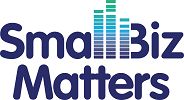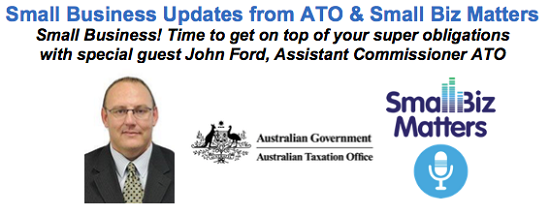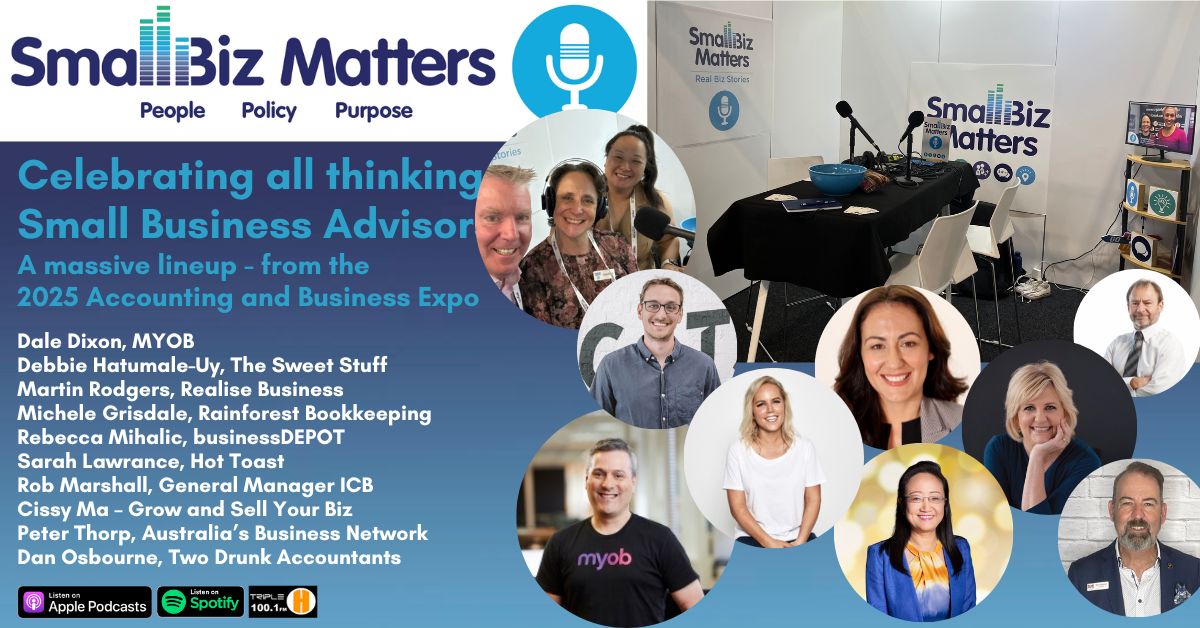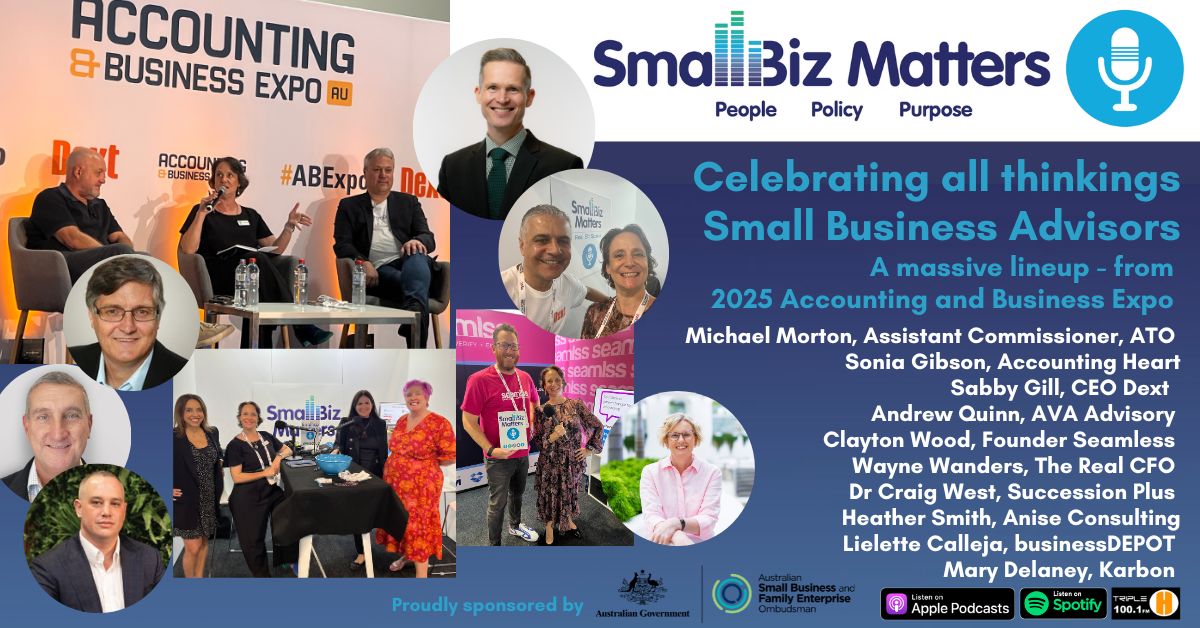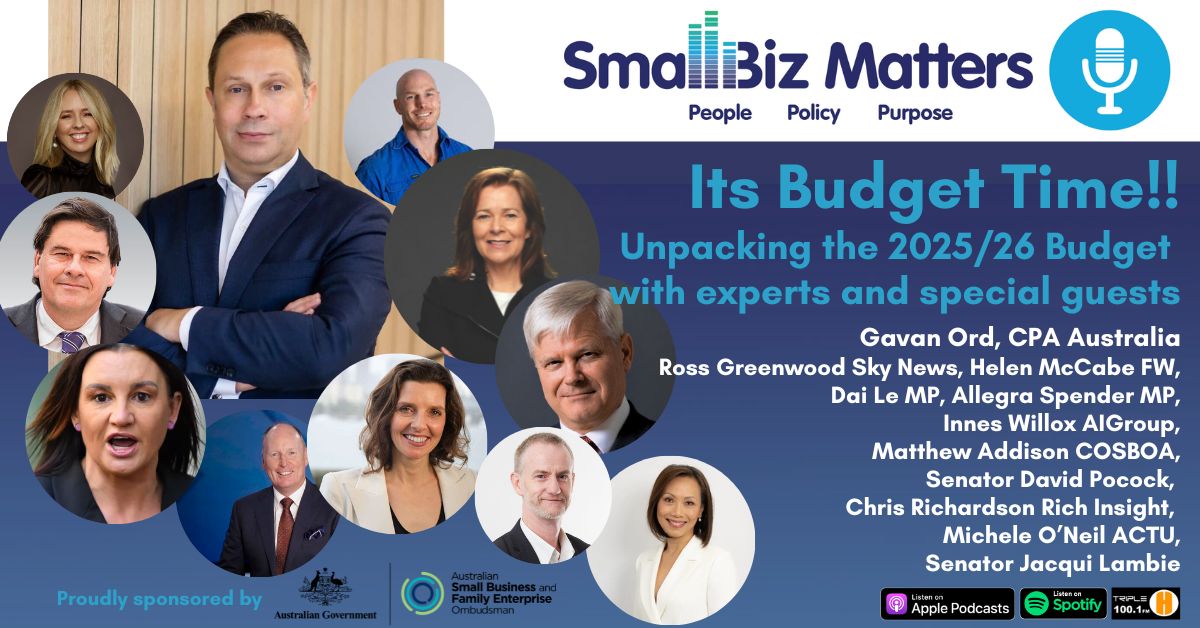Superannuation Guarantee - Get on top of your super obligations
| Tuesday December 3Small Biz Matters – a half hour program each week where you can work ON your business rather than IN it.
with Alexi Boyd, broadcaster, advocate and small business owner.
Date: 3 December 2019
Superannuation - firstly it’s not your money and secondly if you get it right; there’s no need for us to get involved. That’s the message the ATO is trying to get across to small business. If you pay the correct amount, to the right place, at the right time... there’s nothing to worry about. But if you miss the deadline or the you haven’t checked all the details then the headache isn’t worth it.
Are you aware of the deadlines and what that means for super payments? Did you know you still need to meet those deadlines if you’re an employee? Did you know your payment is late if it bounces back? Super doesn’t have to be an administrative headache if you know what your obligations are. Plus there’s plenty of places to get help, advice and support small business it’s just a matter of knowing where to look
The when, the how and the what of super obligations for small business is all explained in this interview with the Alexi Boyd from Small Biz Matters and John Ford, the Assistant Commissioner for Risk & Strategy - Employer Obligations at the Australian Tax Office.
Welcome to the show John.
Topics we’ll be covering:
- Can you give us an overview of super for employers?
- What is super and why does it exist
- The SG super is actually just about the relationship between employer & employee and there is no need for ATO to be involved until things unravel
- Why do we have super guarantee, retirement income and live a healthy lifestyle
- I see that you have developed an easy six step checklist to make sure employers have their SG sorted. Can you take me through the six steps?
- Check you’re paying super to all eligible workers
- Employee SG super, when you start paying super, how it‘s calculated & what constitutes super applicable ordinary time earnings. When ATO gets involved it becomes all Salary & wages
- Check you’re paying the right amount
- check your calculations & systems for 9.5% if you’re still using old spreadsheets
- Check you’re paying on time
- deadlines, time lag between authorising the payment & clearing house making payment & when the money actually hits the super fund
- Check you’re paying to the right place
- details are all correct, processing with inducting employees & making sure the super choice form completed (due diligence)
- Discussion - Is this the same as the letter from your super fund? Gathering the right info from employees
- Check you’re paying the right way – what is a clearing house?
- What does the ATO provide as an alternative? (ATO SBSCH)
- Check you’re keeping accurate records
- what constitutes accurate reporting?
- STP
- Check you’re paying super to all eligible workers
- Most employers do the right thing, but there are always those few that do not. What is the ATO doing to level the playing field?
- Link to STP data and why it’s in place?
- Employer payment amount and times vs what the super fund. Chat about the data coming from Super funds – is it solid?
- What impact does 4-5 days late every quarter have on the long term retirement income.
- A number of changes aimed at protecting employees' superannuation entitlements have recently become law. Can you tell us more about this?
- Talk to recent changes.
About John Ford:
John Ford is an Assistant Commissioner, who has been has been with the ATO since 1998. He has held senior roles in a number of business lines including Superannuation, Private Groups and High Wealth Individuals, Goods and Services Tax, and Small Business.
John is currently the leader of the ATO’s Risk and Strategy – Employer obligations portfolio. In this role he is responsible for the ATO’s approach to ensuring that employers are engaged with meeting their Superannuation Guarantee, Fringe Benefits Tax and Pay as You Go Withholding obligations. A key component that John is seeking from the work he leads is to be increasingly driven and transparent in what the ATO is seeing and how the ATO intends to respond to help employers to meet their obligations.
To find out more go to their website:
Resources
- Super guarantee employer obligations course - https://www.ato.gov.au/Business/Super-for-employers/Working-out-if-you-have-to-pay-super/Super-guarantee-employer-obligations-course/
- Brochure - ‘Paying super is an important part of being an employer’ https://www.ato.gov.au/superquickcheck
- Video - https://www.ato.gov.au/Business/Super-for-employers/
- Super guarantee client health check - https://www.ato.gov.au/business/super-for-employers/in-detail/super-guarantee-client-health-check/
Tools and Calculators
- To work out who you have to pay use the Super Guarantee Eligibility Tool
- Some contractors, even if they have their own ABN may be eligible for super. To check, use the Employee/Contractor Decision Tool
- To work out how much super you must contribute for your eligible workers use the Superannuation guarantee (SG) contributions calculator
